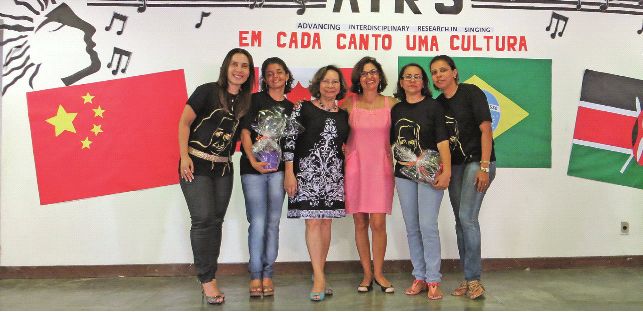Brazilian Quadcultural Songbook Article, July 2013
Music Full of Harmony - by Adriana Carvalho (translated by Tom Germaine)
Mosiaco 41, 07/03/13
View original article (pdf)

A Canadian project, developed in 15 countries, is proof that singing is an excellent tool to help children learn. Two Brazilian schools participated in the experiment. Children in a public school in Salvador, Bahia, made one very special presentation last year. Using a computer, they loosened their voices, singing a song for a group of Canadian children in that country who watched live over 9000 miles away. In return, the children's foreign colleagues heard one song of Brazilian music. The show among nations established the participation of Brazil in the project - Advancing Interdisciplinary Research in Singing (AIRS). Coordinated by Dr. Annabel J. Cohen, of the University of Prince Edward Island, the Canada, this project has among its objectives using music as a tool for children to know and learn about other cultures and people. Ongoing since 2009, the initiative today involves more than one hundred researchers in 15 countries and six continents. Among them is Brazil, which already applied the method to two classes at two schools - Bahia: the Educational Center San Antonio (CESA) and at the School Second of July.
"The research aims to investigate whether the comprehension students have about other cultures can be developed by interpreting vocal music. Representative music of each culture was chosen, in our case we used music from Brazil and also China, Canada and Kenya. Those chosen to participate in the project in Brazil were two classes of children of the fifth year (between 10 and 11 years old)", explains Professor Alda de Jesus Oliveira, of Cesa, who was part of the research team.
Empathy
According to her, the children received materials containing videos with musical examples from each country, interpreted by the children themselves from the participating countries. "The lyrics of songs children see in the video are pronounced slowly, sentence by sentence", she stresses.
Furthermore, classes received two books: the first is illustrated containing key information about the characteristics of each culture studied and the second with all the songs selected (six from each country), and the second of musical scores and translations of the Portuguese lyrics. They also had CDs with songs sung by children from countries studied.

"The goal of the project was that children should at least learn one song of each culture. However, in Cesa, children learned a song from China, six songs from Kenya, six songs from Brazil and three songs of Canada. It can be considered a good result", celebrates the teacher. The researcher says that during the lesson project, conducted between March and June last year, children listened to the CDs, watched the videos and then received teacher explanations about the culture and habits of the people of each country involved. The songs were sung as exercises with body movement and execution of some of the songs that play suggested.
"The classes not only absorbed most of the information, they also created a unique presentation of the content, establishing a order for the speeches and producing materials on the cultures. Students at first did not have much interest to ask questions, but over time began to be more interested and to seek other sources of information about the content" says Alda. The children learned about the different languages, coins, the sights, the history, location, geography, customs, physical types of people, the costumes, the food, the density demographic, major cities, the games and the religions practiced, among other issues. Alda says that at the end of the project, a musical performance in the school auditorium was held. Students danced and sang songs they had learned, and dressed in costumes of each country.
"The qualitative results observed are that children participants learned and surprised us all, getting to sing in a foreign language, learning content and targeted topics -specific features comprising people. All this with joy, interest and motivation that surprised the researchers and teachers" Alda says.
Global search
Annabel Cohen, research coordinator, says that one of the indicators of the success of the initiative is the fact that it has achieved much in the last four years, gathering together many researchers in different nations to share their knowledge. Besides the countries studied by Brazilian students (China, Kenya and Canada), the AIRS project also includes other nations, such as Australia, Austria, Estonia, France, Germany, Poland, Iceland, Portugal, South Africa, Switzerland, United Kingdom and United States.
"We also have employees among researchers from India, Malta and Greece ", says Annabel. She says the project is evaluating the benefits of singing in education from three perspectives. "The first considers the relationship between perception and music production. Second, the development of teaching and learning, and the third aims to study the influences on cultural understanding", explains the Canadian researcher. According to her, another benefit of using music in education is to combat any prejudices between nations. " Félix Neto, is a great psychologist from the University of Porto, Portugal, conducted research showing that when children learn songs of another country against which they may have prejudices, helps to improve their learning and their attitudes towards people of that country. With the help of the AIRS project, the teacher could, Neto noted, expand their project on a greater scale. A second study conducted by him showed that the bias towards another people after learning their songs was reduced for months after the completion of the project. That discovery is very important because it shows there is possibility that biases acquired very early in the life of a person can be modified simply by learning songs of that culture, "says Annabel. And that with all the pleasure and the beauty of music!



